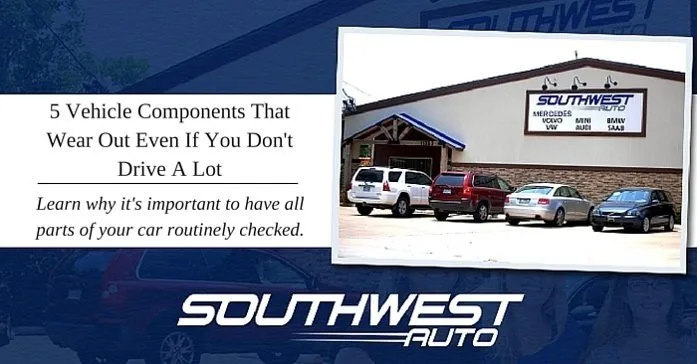Many drivers believe that if they drive infrequently, their vehicle’s parts will last longer and require less frequent service. For some vehicle components, that’s true. Interior and exterior lights, for example, typically don’t fail if they’re not used. However, other vehicle components will wear out even if you keep your car parked most of the time. Read on for concrete examples illustrating why it’s important to have all parts of your car routinely checked.
Batteries
Many motorists don’t realize that once a battery is 4 or 5 years old, it has weakened to the point that it should be replaced. In hot climates, batteries often fail after 3 years. Even a battery that’s not used frequently is subject to evaporating battery fluid, a swollen battery casing (often due to extreme heat) and leaks and corrosion around battery posts.
Fuel Pump
Unlike batteries that often provide advance warning that they’re nearing the end of their lifespans, fuel pumps fail without warning. Once your vehicle reaches the 60,000-mile mark, it’s time to make a fuel-pump evaluation part of your routine vehicle maintenance. A skilled technician is trained to spot signals (such as a faulty electrical connection or clogged fuel line) indicating a fuel pump is in jeopardy.
Timing Belt
Even if you use your car to run errands around town, time is not a friend to your car’s timing belt. Many motorists don’t know much about this part and, consequently, never have it replaced. That’s a costly mistake, as the timing belt is one of your vehicle components that wear out as a result of environmental factors. Rubber belts degrade over time due to expanding and contracting with temperature changes. If a timing belt breaks, as it eventually will if not replaced, it could damage your engine’s valves. The price tag to repair engine valves is in the thousands. Don’t risk it!
Tires
You’ve undoubtedly seen the disastrous consequences of worn tires, as highways are littered with their debris. The older a tire is, the greater the risk its tread will separate. Again, extreme temperatures take a toll on tires even if they’re not driven much. You can check the age of your tire on its sidewall. Look for a series of numbers and letters beginning with DOT. The last four-digit section will say something like 1415. The first two digits indicate the week the tire was made and the last two digits indicate the year it was made. There is no concrete consensus on how long tires will last on a car not driven frequently. A good rule of thumb is that once tires reach 6 years old, have them evaluated annually. Owning a car involves regular service and occasional repairs. Your car’s tires are especially prone to wear and tear.
Muffler
Your vehicle’s muffler is part of its exhaust system. Your exhaust system is made up of metal parts. Metal rusts! Even if you don’t drive often, the metal in your muffler will corrode over time. The sooner you know about potential problems, the less costly the repair will be.
Skipping Service Maintenance Schedules Can Have Serious Consequences
Even if you drive infrequently, you still need regular preventive maintenance and vehicle checkups to ensure that your car is safe to drive. Has it been awhile since your car has been evaluated? Contact us at Southwest Auto.
 11353 Mathis Avenue Dallas, TX 75229
11353 Mathis Avenue Dallas, TX 75229
